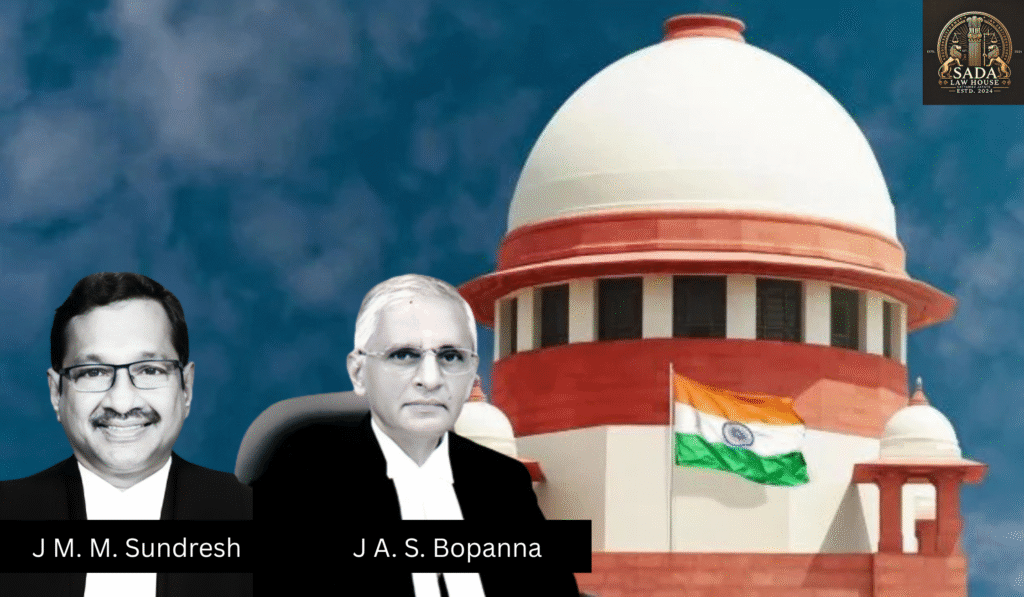Mangilal v. State of Madhya Pradesh – Supreme Court Acquittal for Non-Compliance with Section 52A NDPS Act (2023)
Trending Today Supreme Court Grants Interim Protection to Journalist Abhisar Sharma in Assam FIR Kerala High Court Rules Judges Must Personally View Obscene Video Evidence Before Conviction Gujarat HC Lawyers Meet CJI Over Transfer Proposal of Justice Sandeep Bhatt Bombay High Court Restrains Sanjay Nirupam from Making Communal Remarks Against Slum Developer Ankita Bhati v. Dev Raj Singh Bhati – Supreme Court Reiterates Wife’s Convenience Paramount in Transfer of Matrimonial Cases (2023) Presidential Reference on Deadlines for Governors: Supreme Court Hearing Enters Day 5 LEGAL INTERNSHIP OPPORTUNITY AT CHAMBERS FOR JUSTICE, DELHI LEGAL INTERNSHIP OPPORTUNITY AT AVNEESH ARPUTHAM LEGAL JOB OPPORTUNITY AT RISHABH GANDHI AND ADVOCATES LEGAL JOB OPPORTUNITY AT UTKRISHTHA LAW OFFICES Mangilal v. State of Madhya Pradesh – Supreme Court Acquittal for Non-Compliance with Section 52A NDPS Act (2023) Justice M. M. Sundresh, Justice A. S. Bopanna 12 July 2023 Introduction The Supreme Court in Mangilal v. State of Madhya Pradesh set aside a conviction under Sections 8(b) and 15(c) of the NDPS Act, 1985. The Court held that non-compliance with Section 52A (procedure for inventory, certification, and disposal of seized narcotics) is fatal to the prosecution’s case. Facts of the Case Mangilal was accused of possessing 98 kg of poppy husk. The trial court convicted him under Sections 8(b) & 15(c), sentencing him to 10 years RI + fine. The conviction was upheld by the Madhya Pradesh High Court. Before the Supreme Court, Mangilal argued that mandatory safeguards under Section 52A were not followed. Issues Whether non-compliance with Section 52A NDPS Act vitiates the conviction? Can reliance solely on oral testimony of police officials sustain conviction without certified inventory/chain of custody? Did the lower courts err in upholding conviction despite serious procedural lapses? Petitioner’s Arguments No compliance with Section 52A (no Magistrate certification, no proper inventory, no valid samples). Conviction rested only on police testimony, with no independent corroboration. This violates the fair trial guarantee under Article 21 of the Constitution. Respondent’s Arguments Contraband was lawfully seized and recovery was proved. Minor procedural lapses should not override substantive proof. Police testimony is credible and sufficient in narcotics cases. Judgment The Supreme Court acquitted Mangilal, holding that: Section 52A is mandatory; failure to comply renders the case unsustainable. No Magistrate’s certification, no inventory, and non-production of seized material fatally undermined the prosecution. Sole reliance on police testimony is insufficient in serious penal cases. Conclusion The Court reaffirmed that procedural safeguards under NDPS Act are not optional. Strict compliance with Section 52A is necessary to ensure fairness and protect against misuse. Since the prosecution failed to establish integrity of the seized narcotics, Mangilal’s conviction was set aside. Leave a Reply Cancel Reply Logged in as Aliya Ansari. Edit your profile. Log out? Required fields are marked * Message* Case Laws Ankita Bhati v. Dev Raj Singh Bhati – Supreme Court Reiterates Wife’s Convenience Paramount in Transfer of Matrimonial Cases (2023) Aliya Ansari • August 29, 2025 • Case law • No Comments Mangilal v. State of Madhya Pradesh – Supreme Court Acquittal for Non-Compliance with Section 52A NDPS Act (2023) Aliya Ansari • August 28, 2025 • Case law • No Comments The eligibility of extended limitation and penalties under Central Excise law in cases of alleged duty evasion by M/s Reliance Industries, based on bona fide classification disputes. Aliya Ansari • August 28, 2025 • Case law • No Comments 1 2 3 … 5 Next »










